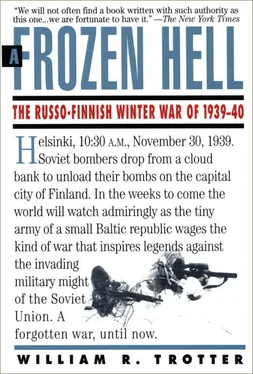William Trotter - A Frozen Hell
Здесь есть возможность читать онлайн «William Trotter - A Frozen Hell» весь текст электронной книги совершенно бесплатно (целиком полную версию без сокращений). В некоторых случаях можно слушать аудио, скачать через торрент в формате fb2 и присутствует краткое содержание. Город: Chapel Hill, Год выпуска: 2000, ISBN: 2000, Издательство: Algonquin Books of Chapel Hill, Жанр: military_history, История, на английском языке. Описание произведения, (предисловие) а так же отзывы посетителей доступны на портале библиотеки ЛибКат.
- Название:A Frozen Hell
- Автор:
- Издательство:Algonquin Books of Chapel Hill
- Жанр:
- Год:2000
- Город:Chapel Hill
- ISBN:978-1565122499
- Рейтинг книги:3 / 5. Голосов: 1
-
Избранное:Добавить в избранное
- Отзывы:
-
Ваша оценка:
- 60
- 1
- 2
- 3
- 4
- 5
A Frozen Hell: краткое содержание, описание и аннотация
Предлагаем к чтению аннотацию, описание, краткое содержание или предисловие (зависит от того, что написал сам автор книги «A Frozen Hell»). Если вы не нашли необходимую информацию о книге — напишите в комментариях, мы постараемся отыскать её.
A Frozen Hell — читать онлайн бесплатно полную книгу (весь текст) целиком
Ниже представлен текст книги, разбитый по страницам. Система сохранения места последней прочитанной страницы, позволяет с удобством читать онлайн бесплатно книгу «A Frozen Hell», без необходимости каждый раз заново искать на чём Вы остановились. Поставьте закладку, и сможете в любой момент перейти на страницу, на которой закончили чтение.
Интервал:
Закладка:
Even a sympathetic biographer, however, has trouble with Mannerheim’s attachment to the Lapuans. Street brawlers were never his style; the idea of Mannerheim embracing Kurt Wallenius and his bully squads seems about as likely as the image of Field Marshal Hindenburg whooping it up with the Brown Shirts in a Munich beer hall. But Mannerheim saw the Lapuans as he wanted to see them, not as they really were. He voiced the opinion that the movement was an “expression of the Finnish people’s reaction to the abuse of freedom and democracy” and justified the Lapuans’ violent tactics by proclaiming that “balance reasserts itself sooner or later and the moment comes when the broad masses feel instinctively that order is preferable to unbridled liberty.” [7] Forbes, 243.
The Baron had enough sense to avoid backing a loser, however, and when the public turned on the Lapuans, he subsided into rumblings and grumblings to which few people listened seriously.
During the years between wars, Mannerheim seems to have been a solitary and rather lonely figure. He lived by himself with a small retinue of servants, in a big house in the Kaivopuisto neighborhood of Helsinki. Accounts by several people who visited him there agree that the house was furnished in an austere and overwhelmingly masculine style—hunting trophies, banners, plaques, weapons, framed certificates of honor, etc. “Even while he lived there, the house was taking on the air of the museum it was to become after his death,” wrote Rosita Forbes, a journalist who interviewed him just before the outbreak of hostilities. [8] Ibid., 273.
Prominently displayed on the Baron’s living room wall was an autographed portrait of Nicolas II. If any visitor were to remark on the appropriateness, or lack thereof, of this exhibit, Mannerheim would answer in a flat, declarative voice: “He was my emperor.”
When P. E. Svinhufvud was elected president in 1931, Gustav Mannerheim was recalled to public service and given the post of chairman of the Defense Council. He worked hard to build Finland’s defenses, and he was forced to fight for every markka in his share of the budget, often with the notoriously tight-fisted Paasikivi. Worn out from these unsavory bureaucratic struggles, he resigned again in 1937, only to be reinstated by President-elect Kallio.
When Stalin’s territorial demands became known to him in October 1939, Mannerheim consistently urged a policy of conciliation. He soon got a reputation for being the ghost at the banquet, and Prime Minister Cajander finally let it be known that he was ready to accept the Marshal’s resignation. Members of the then-powerful National Coalition party openly criticized Mannerheim for being too old, too afraid of the Russians, and—the most infamous criticism of all—for being a man who could not be trusted. Kallio finally agreed that the old man would have to go, only days before hostilities broke out, but the first Russian bombs fell on Helsinki just before the Baron’s resignation was formally accepted. Instead of being sacked, he was instantly appointed commander in chief. Even the old knight’s worst political enemies knew he was the only possible choice to lead the nation’s armed forces.
By the time Mannerheim actually became president of Finland in 1944, it was a bitter and ironic triumph, a role of almost Shakespearean despair. He was seventy-seven years old, worn out from years of wartime stress, and in fragile health; his nation was ravaged, exhausted, bankrupt, and savagely truncated. During his nineteen months in office he was often too sick to conduct daily business. Eventually, and very gently, his resignation was again requested, and the Baron stepped down, choosing, characteristically enough, to retire in Switzerland rather than in Finland.
He had done much more than simply lead his nation through two wars; he had led it out of war with Russia, yet managed to keep it free, identity intact. Whatever one may think of this or that element of his character and career, the independence of Finland is itself his monument; that achievement alone makes him loom as a genuine hero.
All that remained to him were five sunset years of tranquil retirement, mostly spent writing his curiously dispassionate memoirs—so matter-of-fact when dealing with the apocalyptic battles against the Red Army, yet so achingly nostalgic in their brief allusions to the world of Imperial Russia, now as remote to us, and by then, probably to him as well, as the world of lost Atlantis.
Mannerheim died on January 28, 1951; the Finnish civil war had begun on January 28, 1918. The synchronicity was a final touch of irony in a life that had been filled with ironic drama. He had been a majestic actor on the stage of Baltic history. Against his few but large-scale successes must be balanced many failures, and against those failures and successes alike must be balanced the legend that shrouds him now. It is a powerful legend, but it is based on facts. Historian Marvin Rintala, author of the best English-language study of Mannerheim and a writer who could be scathingly critical of him, was finally forced to this assessment of him: “He was a noble man, as well as a nobleman.” [9] Rintala, 26.
“Mannerheim did not grow up among the masses, but in a castle…. he was a cosmopolite in the age of nationalism; an aristocrat in the age of democracy; a conservative in the age of revolutions.” [10] Ibid., 22, 36.
There is no question that Mannerheim’s politics were a dizzying anomaly, so much so that perhaps they should not be judged on ideological grounds. For all his anti-Bolshevism, for all his flirtation with the grubby machinations of the Lapuans, the man was not an ideologue. All that he did, all that he said, probably every single thing that he thought derived from the fact of his aristocratic birth and from the worldview he inherited from that birth in a prerevolutionary, predemocratic milieu. He was “The Baron” to his fingertips. Everyone who worked with or against him, whether they liked or hated him, agreed with or detested his politics, was struck by the man’s sheer physical bearing. When Hitler met Mannerheim for the first time, in June 1942, it was the führer who bowed, while the Baron remained stiffly at attention.
He was patriotic; he cared about Finland, but nationalistic zeal was not a strong part of his makeup. On the other hand, it was this very same lack of nationalistic passion that enabled him to walk his nation across an incredibly narrow tightrope in 1944, with its integrity, honor, and identity surviving on the other side. A more fire-breathing Finnish leader, Väinö Tanner, for example, might have succumbed to fantasies of last-ditch stands in the forest. History has proven this, in fact, to be Mannerheim’s greatest single accomplishment. Finns today find the idea of another war with Russia all but inconceivable (although the border defenses, to be sure, remain strong). There are few Finns still alive who can remember the barbarities of 1918, while nearly every Finn living today treasures the state of peaceful relations that exists between Finland and its giant neighbor. And one of the chief architects of that situation, Mannerheim, is still respected by the majority of Finns, even if the element of reverence has long since evaporated.
The eccentric nature of Mannerheim’s patriotism is perhaps nowhere so clearly illustrated as in the matter of language. Born to Swedish-speaking nobility, and quite fluent in Russian and French (which he spoke in the elegant, high-flown manner of the Romanov Court), he could also converse passably in English, Polish, and German. Yet he did not bother to learn Finnish until his fiftieth year, regarding it as a barbarous and provincial tongue, a fact that will appear strange only to readers who have never attempted to grapple with that convoluted and unwieldy language. During the civil war he required the constant services of an interpreter just so he could pass orders to the Finnish-speaking troops under his command. One modern historian, after listening to recordings of Mannerheim’s wartime speeches, stated that “to put it bluntly, Mannerheim’s Finnish pronunciation is beyond belief, ranking with Winston Churchill’s French. Churchill, at least, did not have to govern the French.” [11] Ibid., 21.
Интервал:
Закладка:
Похожие книги на «A Frozen Hell»
Представляем Вашему вниманию похожие книги на «A Frozen Hell» списком для выбора. Мы отобрали схожую по названию и смыслу литературу в надежде предоставить читателям больше вариантов отыскать новые, интересные, ещё непрочитанные произведения.
Обсуждение, отзывы о книге «A Frozen Hell» и просто собственные мнения читателей. Оставьте ваши комментарии, напишите, что Вы думаете о произведении, его смысле или главных героях. Укажите что конкретно понравилось, а что нет, и почему Вы так считаете.












